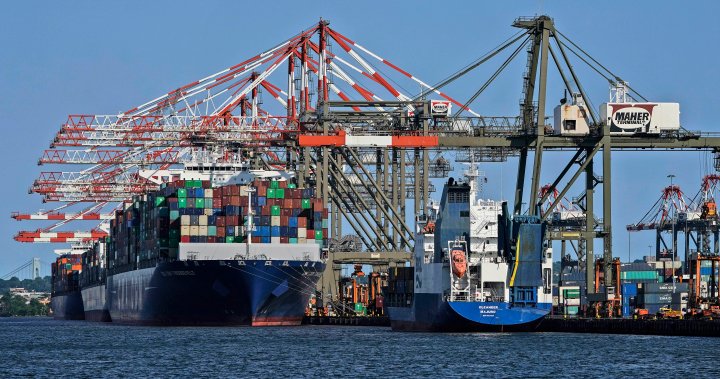A potential strike at U.S. seaports on the East Coast and Gulf of Mexico is threatening to disrupt supply chains following a Canada-wide rail shutdown. The International Longshoremen’s Association (ILA), which represents roughly 45,000 dockworkers at three dozen seaports, has threatened to walk off the job on October 1 if they do not reach an agreement on a new contract with the United States Maritime Alliance (USMX). This could result in severe disruptions to the flow of goods in North America, as many imports to Canada come through American ports that have a higher capacity than Canadian ports.
The Port of New York and New Jersey, which is the largest East Coast port, ships about $300 billion worth of goods annually, while the Port of Montreal and Port of Halifax in Canada handle significantly fewer goods. The potential strike at the U.S. ports could result in a significant backlog of cargo, causing delays that would take weeks or months to clear. Analysts estimate that it could take anywhere from four to six days to clear the backlog from just one day of strike action, with longer strikes potentially causing delays well into 2025.
The global shipping industry is already facing challenges such as increased shipping and freight costs due to inflation since the COVID-19 pandemic, along with other disruptions like a drought at the Panama Canal and attacks on container vessels in the Red Sea. The National Retail Federation has reported that retailers are rushing goods into the U.S. to prevent shortages during the holiday shopping season. West Coast ports are already seeing increased traffic due to uncertainty over the East Coast labor dispute, reflecting concerns over potential disruptions to the supply chain.
The International Longshore and Warehouse Union (ILWU) on the West Coast ratified a new contract last year that included a significant pay increase and improved benefits. The ILA is aiming for a similar deal in their negotiations with the USMX. Talks broke down over the summer but are set to resume in the weeks leading up to the strike deadline, with both sides requesting federal mediation. The ILA has expressed concerns about job losses due to automation, while the USMX maintains that their proposal aims to modernize operations while protecting jobs and hours.
The ILA president has accused the USMX of profiting off the backs of longshore workers and has reiterated their commitment to following through on threats of a strike. The need to make commerce activities an essential service in all sectors has been highlighted by the labor disruptions in Canada’s rail industry and the potential strike at U.S. ports. The lack of legislation in both Canada and the U.S. to prevent interruptions to port activity creates uncertainty for shippers, exporters, importers, and ultimately drives up costs that are passed on to consumers. The impact of these disruptions on the supply chain could be severe, with potential delays and backlogs lasting well into the future.


